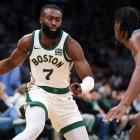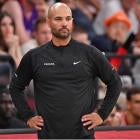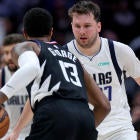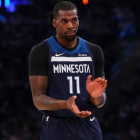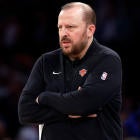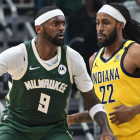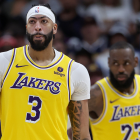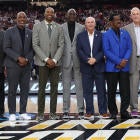The Detroit Pistons seized an opportunity Friday, nabbing guard Avery Bradley from the Boston Celtics, who needed to create cap room to sign star free agent Gordon Hayward. In exchange for Bradley, the Celtics got forward Marcus Morris, who could potentially start for them next season depending on what else president Danny Ainge has up his sleeve. Let's grade the trade:
Pistons receive Avery Bradley, 2019 second-round pick
How can you not love Bradley? He is one of the best perimeter defenders on the planet. Quick, aggressive and disciplined, he hounds point guards and stays in front of bigger players who foolishly think they can bully him. Over the past few seasons he has quietly developed into an excellent 3-point shooter, and last season he became one of the best rebounding guards in the league when the Celtics needed him to. He is the better of the two players, but his contract status put him in a strange position. While he is woefully underpaid now, he deserves to receive the biggest payday of his career when he becomes a free agent next summer.
The Pistons are lucky to be the team that gives him that payday. He will immediately help them at both ends of the court, and his presence means they shouldn't have to overpay Kentavious Caldwell-Pope in free agency. Had Detroit re-signed Caldwell-Pope, it would have done so in hopes of him turning into a player as dependable and mature as Bradley one day. Simply getting Bradley is the safer option.
Last season's Pistons lacked spirit, camaraderie and intensity. They were the 25th in offensive rating, and their defense was only average for most of the season. They needed a course correction, and Bradley can be a part of that. He came into the league on a stacked Boston team and learned lessons from Kevin Garnett, Paul Pierce and Rajon Rondo, earning his spot in the rotation because of his commitment to defense. Unlike Garnett, Bradley is quiet, but will set an example in the locker room and on the practice court.
Detroit is looking to rebound from a season that was disappointing in every way. With the East getting worse and worse, it has a great shot at returning to the playoffs, especially with Bradley is in the fold. This is a solid move by Stan Van Gundy's front office, and it brings the added benefit of balancing out the roster. While Morris was effective in his role, the Pistons have a bunch of forwards -- Tobias Harris, Jon Leuer, Stanley Johnson and Henry Ellenson -- who need to play.
The risk, of course, is that Bradley is under no obligation to stay in Detroit beyond next season. This deal won't look good if he turns out to be a rental, so it is up to the organization to prove it is the right place to spend the prime of his career. Grade: B-plus

Celtics receive Marcus Morris
This is a weird one to evaluate because of the circumstances. To facilitate the Hayward deal, Boston needed to dump a good player for nothing or do something like this. Morris is a downgrade from Bradley in terms of pure value, but the Celtics now have $30.8 million in cap room, per ESPN's Bobby Marks. That's enough to accommodate Hayward's maximum contract.
Should they have kept Bradley and traded somebody else? He's certainly a nice fit next to Isaiah Thomas and Hayward, and there's even an argument to be made that president Danny Ainge's best plan would have been to draft Markelle Fultz and trade Thomas. Bradley and Thomas are both free agents next summer, so unless ownership would have been willing to pay a ridiculous luxury-tax bill, one of them had to go eventually.
Was this the best use of Bradley's contract? Maybe not. He could have been used in a trade for a star like Jimmy Butler or Paul George over the past few months. Perhaps it would have been better to trade him for a first-round pick rather than another role player. Boston already has a ton of picks and young players, though, so I'm not convinced that would accomplish much.
If you're still feeling underwhelmed by this return, it's because it's hard to say the Celtics got great value for Bradley. Given the circumstances, though, the move is understandable. It's probably better to look at this as a massive trade -- Bradley, Kelly Olynyk, Amir Johnson and Tyler Zeller for Hayward and Morris -- rather than simply Bradley for Morris.
Morris is on a bargain contract (two years remaining for $10.4 million) and is an interesting fit. He can play both forward positions, stretch the floor a bit and switch onto smaller defenders. The issue is that he brings some of the same weaknesses as Al Horford: he's not a shot-blocking presence, nor is he a good rebounder for a big man. Hayward obviously makes Boston better, but there's still a glaring hole on the roster because those weaknesses haven't been compensated for. Ainge is trying to turn this team into a title contender and build something sustainable, so he still has work to do. Grade: B














